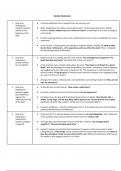Hamlet Flashcards
1. How does ● Costume establishes him as separate from the corrupt court
Shakespeare
establish Hamlet’s ● When explaining to his mother why his grief ‘seems’ much deeper than others, Hamlet
nobility at the exclaims, ‘Seems, madam! nay it is; I know not 'seems’, presenting him as a man of integrity
beginning of the and sincerity.
play?
● Hamlet’s opening soliloquy shows him condemning the court and thus establishing his moral
superiority.
● In Act 3 Scene 1, Shakespeare uses Ophelia to establish Hamlet’s nobility: ‘O, what a noble
mind is here o'erthrown! [...] The expectancy and rose of the fair state’ [‘Rose’ - metaphor -
the beauty/hope/jewel of Denmark]
2. How does ● Ophelia recalls her meeting with the ‘mad’ Hamlet: ‘his stockings foul'd, ungarter'd’ ‘his
Shakespeare knees knocking each other’ [contrasts with ‘I know not ‘seems’’]
convey Hamlet’s
loss of nobility? ● In the chamber scene, Hamlet rashly strikes the arras: ‘How now! a rat? Dead, for a ducat,
dead!’, with the language of money and gambling ‘for a ducat’ conveying a sense of flippancy
and suggesting he sees little value in Polonius’s life. This irreverence is reinforced when he
tells his mother ‘I’ll lug the guts’ of Polonius away, with the crudeness of his language hinting
at a lack of remorse or respect.
● Arranges the murders of Rosencrantz and Guildenstern, later telling Horatio that ‘they are not
near my conscience’.
3. How does ● As Hamlet dies, Horatio laments, ‘Now cracks a noble heart’.
Shakespeare
perhaps suggest ● As he dies, Hamlet’s final wish is that Fortinbras ‘has my dying voice’
that Hamlet has
regained his ● Fortinbras closes the play with the following description of Hamlet: ‘Bear Hamlet, like a
nobility by the end soldier, to the stage; /For he was likely, had he been put on, To have proved most royally’
of the play? [symbolism of simile ‘like a soldier’ - finally mirrors his ‘armoured’ father]
● However, ambiguous, as the first ambassador returns to the stage with news of the needless
deaths of Rosencrantz and Guildenstern
4. How does ● At the end of Act 1, Hamlet decides that he will put on ‘an antic disposition’, later reinforced
Shakespeare in the chamber scene when he tells his mother that he is ‘mad in craft’
indicate that
Hamlet’s madness ● The hyperbolic and performative nature of Hamlet’s madness: ‘his stockings foul'd,
is feigned? ungarter'd’ ‘his knees knocking each other’
● Hamlet’s madness as controlled and intentional: he appears mad and nonsensical when
calling Polonius a ‘fishmonger’ which contrasts with the honest and sincere tone of ‘I have of
late--but wherefore I know not--lost all my mirth’ which follows his interaction with Polonius.
The ability to shift suggests that he is in control.
, 5. How does ● Hamlet is deeply melancholic, which could be viewed as a form of insanity: ‘O, that this too
Shakespeare too solid flesh would melt /Thaw and resolve itself into a dew!’ [imagery of water - passive -
perhaps imply that water offers no resistance - pun of ‘a dew’ adieu - longing for death]
Hamlet’s madness
might be genuine? ● Hamlet’s treatment of Ophelia seems deranged and disproportionate, repeatedly declaring
‘get thee to a nunnery!’
● Hamlet’s behaviour in the chamber scene: ‘How now! a rat? Dead, for a ducat, dead!’, also
frightening his mother with his unhinged behaviour: ‘What wilt thou do? thou wilt not
murder me? Help, help, ho!’
6. Where do we see ● Hamlet’s first soliloquy sees him longing for a passive and peaceful escape from life: ‘O that
Hamlet’s passivity this too too solid flesh would melt, thaw and resolve itself into a dew’
and inaction?
● This opening soliloquy ends with, ‘But break, my heart; for I must hold my tongue’ as Hamlet
resolves to hide his grievances i.e. to do nothing.
● In Hamlet’s second soliloquy, he chastises himself for preferring to ‘like a whore, unpack my
heart with words’ rather than kill his uncle [simile - deep thoughtfulness and introspection as
feminine - ‘whore’ conveying a sense of disgust]
7. How does ● Hamlet’s third soliloquy: ‘the dread of something after death, The undiscover'd country from
Shakespeare whose bourn no traveller returns’
convey Hamlet’s ○ ‘For in that sleep of death what dreams may come [...] must give us pause’
fear of death? [metaphor of ‘sleep’ - sees death as respite, escape, ‘pause’ indicates that fear of
death causes hesitation, inaction]
8. Where do we see ● ‘Fishmonger’- Hamlet criticises the overbearing, controlling nature of the Danish court
madness as [‘fishmonger’ as archaic name for brothel-owner, uses Ophelia for his own gain]
agency, a way to
transgress social ● ‘Words, words, words’ - Hamlet criticises the dishonesty of the court, where words are
norms? meaningless [repetition - words have become meaningless to Hamlet as a result of their
insincerity]
● Ophelia tells Gertrude and Claudius, ‘pray you, mark’ as they seek to interrupt her song in Act
4
● Ophelia perhaps gives out flowers to Gertrude and Claudius to accuse them. For example, she
hands them the flower ‘rue’ which, with its bitter taste, had come to symbolise regret,
perhaps implying that they should regret and repent.
9. How does ● Laertes as convinced by her madness, calling her ‘a document in madness’
Shakespeare use
Ophelia’s madness ● Gertrude’s description of Ophelia’s death arguably shows Ophelia lacking any control: ‘Till
as a foil to that her garments, heavy with their drink, pull'd the poor wretch from her melodious lay to
Hamlet’s muddy death.’ [Hamlet’s madness seems controlled]
madness?
10. How does ● In Act 1 Scene 5, Hamlet begs the ghost, ‘Speak, I am bound to hear’ before the ghost replies,
Shakespeare imply ‘so art thou to revenge’.
that Hamlet is
trapped? ● As Horatio begs Hamlet not to follow the ghost in Act 1 Scene 4, Hamlet cries, ‘My fate cries




